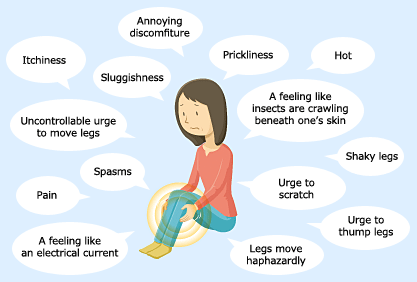Restless Legs Syndrome (RLS), also known as Willis-Ekbom disease, is a neurological disorder characterized by an irresistible urge to move the legs, often accompanied by uncomfortable sensations. These sensations typically occur when at rest or during periods of inactivity, such as when sitting or lying down. Moving the legs temporarily relieves these sensations, providing relief to individuals with RLS.
Symptoms:
- Uncomfortable Sensations: Patients often describe sensations such as crawling, tingling, itching, or aching in the legs.
- Urge to Move: An overwhelming urge to move the legs to alleviate the discomfort.
- Worsening at Rest: Symptoms are typically more prominent during periods of rest, like sitting or lying down.
- Nighttime Symptoms: RLS symptoms often worsen in the evening or at night, leading to difficulty falling asleep.
Causes:
The exact cause of Restless Legs Syndrome is not well-understood, but several factors may contribute:
- Genetics: Family history may play a role, as there appears to be a genetic component to RLS.
- Dopamine Imbalance:Changes in dopamine levels in the brain may be involved, as medications that affect dopamine can sometimes alleviate symptoms.
- Iron Deficiency: Low iron levels or iron deficiency may contribute to RLS in some cases.
- Chronic Diseases: Certain chronic conditions, such as kidney failure, diabetes, and peripheral neuropathy, may be associated with RLS.
- Pregnancy: RLS symptoms can occur during pregnancy, especially in the third trimester.
Treatment:
Treatment approaches aim to manage symptoms and improve sleep quality. Depending on the severity and underlying causes, options may include:
- Lifestyle Changes: Regular exercise, maintaining a consistent sleep schedule, and avoiding stimulants like caffeine and nicotine.
- Iron Supplements: If iron deficiency is present, supplements may be recommended.
- Medications: Dopamine agonists, benzodiazepines, or anticonvulsants may be prescribed to alleviate symptoms.
- Massage and Stretching: Gentle leg massage and stretching exercises may provide relief.
Prevention:
While there is no known way to prevent RLS, adopting a healthy lifestyle and addressing potential risk factors may help manage symptoms:
- Maintain a Healthy Diet: Ensure an adequate intake of iron and other nutrients.
- Regular Exercise: Engage in regular physical activity to promote overall health.
- Good Sleep Hygiene: Establish a consistent sleep routine and create a comfortable sleep environment.
- Manage Stress: Stress management techniques may help reduce symptom severity.































